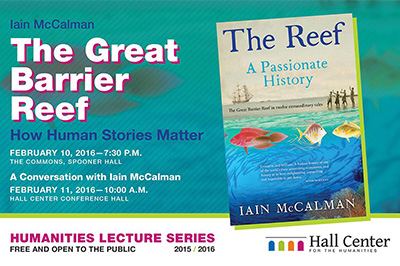Events
Archived Event
The Great Barrier Reef: How Human Stories Matter
Wednesday 10 February 2016
Hall Center for the Humanities, University of Kansas, Lawrence, Kansas
As part of the Humanities Lecture Series
Founded in 1947, the Humanities Lecture Series series has consistently been a hallmark for quality, providing a forum for interdisciplinary dialogue between renowned speakers, the university and the surrounding communities. These events are free and open to the public–no tickets are required. Partial funding for the Humanities Lecture Series is provided by The National Endowment for the Humanities’ 2000 Challenge Grant.
ABSTRACT
Stretching 1,400 miles along the Australian coast and visible from space, the Great Barrier Reef is home to three thousand individual reefs, more than nine hundred islands, and thousands of marine species, and has alternately been viewed as a deadly maze, an economic bounty, a scientific frontier, and a precarious World Heritage site. Now acclaimed historian, explorer, and University of Sydney Professor of History Iain McCalman takes us on a new adventure into the reef to reveal how our shifting perceptions of the natural world have shaped this extraordinary seascape. Showcasing the lives of Twenty individuals spanning more than two centuries, “The Great Barrier Reef: How Human Stories Matter” highlights our profound desire to conquer, understand, embrace, and ultimately save the world’s most complex ocean ecosystem.
Additional Event
A Conversation with Iain McCalman, “Back to the Future: Teddy Roosevelt’s Anthropocene”
In March 1909, Theodore Roosevelt embarked on an eleven-month, post-Presidential shooting safari that doubled as a scientific expedition to provide the Smithsonian Museum in Washington with complete samples of East Africa’s rich wildlife. As he journeyed on an American-built steam train from the coast to the interior, he congratulated himself on travelling back into a primeval past that was elsewhere lost. The sight of countless herds of wild beasts roaming the savannah evoked for him the primeval epoch of ‘the Pleistocene’. Likewise, the tough white hunters and settlers of British East Africa were nostalgic reminders of the masculine Wild West frontier of his youth. Within a few months, however, he was publicly urging these same pioneers to emulate America by transforming this primitive Eden into a civilized, imperial, ‘white man’s country’, while at the same acknowledging regretfully that this would inevitably lead to the loss of much of the country’s wildlife and the domestication of its ‘savage’ peoples.
McCalman will argue that Roosevelt’s famous African safari proved in fact to be a harbinger and agent of exactly the transformative social and environmental forces that he both regretted and extolled. Despite his lifelong disgust at ‘game butchers’ and ‘trophy hunters’, his own safari behavior savored uncomfortably of both. The eleven thousand specimens procured on his ‘science safari’ not only included several rare and endangered animal species, it also became the catalyst for a new type of commercialized safari industry that would ultimately threaten the biodiversity of the wildlife that he celebrated in newspaper articles and his million-selling book, African Games Trails. If Teddy Roosevelt journeyed back into the Pleistocene, it was as an early agent of a new and destructive Anthropocene.
Thursday 11 February 2016
Hall Center for the Humanities
University of Kansas
